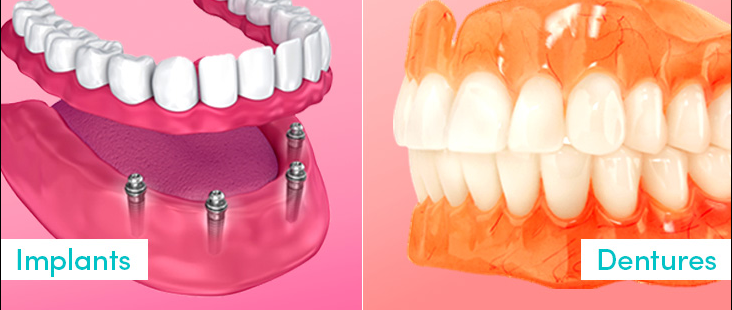What you need to know about dentures and implants

Having healthy and complete teeth is very important. Healthy teeth not only look good, they also help us chew our food properly and speak clearly. Having missing or damaged teeth can have a negative impact on your confidence as well as your eating habits and social life. Whether you’re an adult or a senior, losing teeth can be stressful and leave you feeling self-conscious about your appearance.
The best thing to do in such cases is to find out about the different treatment options available for tooth loss and choose the one that suits you best. If you’re a senior looking for some long-term solutions, then dentures and implants are two of the most popular options available for replacing missing or damaged teeth. Both these procedures are viable solutions for tooth replacement in older adults. Let’s take a closer look at each of them:
What is a denture?
A denture is a set of artificial teeth that are held in place by a metal, plastic, or gum-colored base. Dentures can be made from different materials, but the most common material used for making dentures is acrylic resin. Acrylic resin dentures are not as strong as metal or plastic ones, but they are more comfortable and easier to adjust to.
What is an implant?
An implant is a titanium post that is surgically inserted into the jawbone to serve as a foundation for a crown, bridge, or denture.
How are dental implants different from dentures?
Dentures are removable appliances used to hold your teeth in place. Dentures are custom-made, and they replace all the teeth in the upper or lower jaw. Implants, on the other hand, act like artificial roots for your natural teeth. Implants are surgically inserted into your jawbone, and then a dental crown is placed over them to protect them from further damage. Although dentures provide a quick solution for tooth loss, implants have their own set of benefits that make them a more desirable option for many people:
Pros of dentures
Dentures are a popular option for replacing missing teeth because they’re inexpensive and easy to maintain. They’re also removable and can be taken out when you eat or brush your teeth so you don’t have to worry about food getting stuck in them. Dentures can be fitted to your mouth using either acrylic resin or metal clasps, which means they won’t slip out of place. They come in a variety of colors, sizes, and shapes, and you can get them custom-made by a dentist to suit your needs.
Cons of dentures
Dentures are a popular solution for tooth loss in adults. They can be used to replace one or more missing teeth, but they do have some disadvantages that you need to be aware of before making a decision on whether or not you want them. Some of these disadvantages include:
- The risk of the denture slipping out of place and exposing the gums
- A high possibility of gum soreness
- Difficulty speaking and eating normally because of clunky fitting
Pros of dental implants
Dentures are recommended for adults who want a quick and convenient treatment. It is a less expensive dental procedure done without any anesthesia, whereas dental implants need to be surgically inserted into the jaw before they can be used. This means that dental implants are more expensive than dentures, but they also provide better results in the long run.
A study conducted by the University of South Carolina found that people with dental implants had a higher rate of satisfaction with their appearance and self-confidence than those using dentures. Additionally, people with dental implants were more likely to stick to their treatment plan without missing any appointments.
Dental implants not only offer a better quality of life but are also an effective solution for tooth replacement in adults. Dental implants may be slightly more costly than dentures, but they offer a lot more benefits when it comes to aesthetics and effectiveness in the long run.
Cons of dental implants
Dental implants are artificial teeth anchored into the jawbone. They are usually made of titanium, which is a metal that’s non-biodegradable and can lead to gum disease in some cases. The success rate for dental implants varies from one patient to another and they don’t always last long.
Implants also involve a higher risk of complications if you have any pre-existing health problems like diabetes, heart disease, liver or kidney disorders. Finally, dental implants can cost up to $50000 on average, which makes them a difficult option for many people.
Conclusion
By now you probably know that dental implants are a better option than dentures, but what are the differences? The difference is that dental implants are surgically implanted into the jawbone and they replace missing teeth. Dentures, on the other hand, are removable appliances that are held in place by suction and replace missing teeth.
Dentures are more affordable but dental implants are better for your overall oral health and well-being. Dental implants can also be used to hold false teeth in place. The decision between the two is a personal one, so it’s important to weigh your options carefully.
References:
1-A review of dental implants and infection
Available online 28 March 2009.
https://doi.org/10.1016/j.jhin.2009.02.010
2-Unstable cracking (chipping) of veneering porcelain on all-ceramic dental crowns and fixed partial dentures
Received 10 September 2008, Revised 7 December 2008, Accepted 22 December 2008, Available online 9 January 2009.
https://doi.org/10.1016/j.actbio.2008.12.016



